Peter MALONE
Saturday, 18 September 2021 19:50
Queen of the Damned
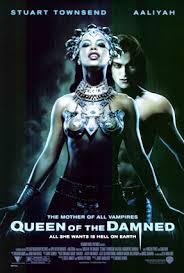
QUEEN OF THE DAMNED
US/Australia, 2000, 101 minutes, Colour.
Stuart Townsend, Marguerite Moreau, Aaliyah, Paul Mc Gann, Vincent Perez, Lena Olin, Tiriel Mora, Bruce Spence, Matthew Newton.
Directed by Michael Rymer.
The Vampire Lestat has had a strange life - or afterlife. Incarnated as Tom Cruise in Interview with a Vampire, Lestat roamed the centuries, vampirising all who stood in his way, getting satisfaction from corruption. Author Anne Rice can spin strange and lurid tales. Now Lestat wants fame and fortune at the beginning of the 21st century. How to do this? Become a Rock Star and develop your cult of fans and fanatics. Lestat makes a fatal mistake - vampires, according to lore, should not draw attention to themselves. This incurs the wrath of his mentor Marius (Vincent Perez) and is a challenge to the queen of the damned, Akasha, (the late singer, Aaliyah). In the confrontation, Lestat wins - and wins as well by vampirising Jess, the vampire researcher who has fallen in love with him.
Queen of the Damned was made in Australia by director Michael Rymer (AFI-award winner for Angel Baby). It is stylishly made, literally dark for the world of the vampires and for the wierdness of Lestat's rock concerts. It is all designed to appeal to younger devotees of vampire films. Vampire purists will find it a bit trying if they do not like the music - they probably will agree with the lore that vampires should keep their activities private.
1. The popularity of Anne Rice’s novels? Her character, Lestat, the vampire? The series of books? This film following Interview with the Vampire? Stuart Townsend taking the place of Tom Cruise? Audience interest? The 20th to the 21st century?
2. The tradition of Vampire lore, the undead, the issues of blood, transforming humans into vampires? The mythology here, ancient times, Marius? His presence in the 18th century, the encounter with Lestat? Transforming him? Their discussions? His sleeping for two centuries, waking in the 21st century? Vampires in the 21st century? Transformations? Modern music, hedonism, celebrations?
3. Australian locations, for the United Kingdom, for London, for Hollywood? The musical score?
4. The special effects, the vampire presence and activity? Make-up? For the rock stars? The concerts?
5. Lestat, awakening, his interest in music, becoming a rock star, becoming a celebrity? His decisions, appearing in the open, this against the rules? His concerts, performance, interviews, television, posters, his band, the fans, television interviews?
6. David and Jesse, the special society, the research into vampires? The meeting? The diary? David and his research? Jesse and her fascination, going to the nightclub, the menace, Lestat rescuing her? The reasons for his not transforming her? The relationship, ultimately transforming her?
7. The Queen of the Damned, the statue, the touch, the blood beginning to flow, her coming to life, arising from the dead, her sexual provocation, performance, control, ability to destroy her enemies in fire? Her death?
8. Marius, his story, his past, with Lestat? Being his patron? Asleep, waking in the 21st century, the fascination?
9. Maharet and her presence to Jesse?
10. The British locations, Hollywood? The role of the agent, with Lestat, supplying him with girls? The various girls wanting to be with him, groupies? Jesse, different, the change?
11. Jesse and her motives, meeting David? Giving him the book?
12. A future for Jesse and Lestart? Further vampire stories?
Published in Movie Reviews
Published in
Movie Reviews
Tagged under
Saturday, 18 September 2021 19:50
My Sweet Pepper Land
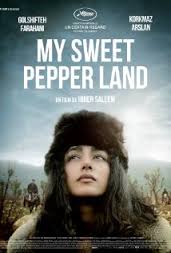
MY SWEET PEPPER LAND
France, Germany, Iraq, 2014, 100 minutes, Colour.
Korkmaz Azlan, Golshifteh Farahani.
Directed by Hiner Saleem.
Some of us might have flown over Kurdistan, the remote area at the borders of Turkey, Iraq, Iran, a mountainous region that has been the location for a number of Ukrainian films. But, most of us have never been to the area. This film offers us an opportunity to venture into this remote region, encounter the people who live there, people of a very different culture and many traditions that are being challenged in the contemporary world.
The director was born in 1965 in Iraqui Kurdistan.
Pepperland is actually the name of the local bar, a venue mainly for the men of the village where the film is set. It plays its part in the confrontations we are invited to watch.
The film opens rather sardonically with a prisoner being asked to invoke the help of Allah. Next, we are in an open courtyard with a military man addressing a small tribunal of a lawyer, a judge, a mullah and a former soldier. They are told that it is 2006, that they are free from Saddam Hussein, that they need to set up institutions, develop a police force as well as a military force. And the symbol of this reconstruction is the use of the death penalty. The pretensions of this meeting are undermined when the accused is put on a large cask and strung up – only for the cask to topple and for him to fall. There is continued discussion about whether the law and the Koran have indications how he should die.
But this is the story of the former soldier who wants to return home. The soldier‘s mother has other ideas and wants him to be married – so he reapplies to work in the police force, agreeing to go to the remote village where he is met on the highway by his deputy and they have to ride by horse to the village because the bridge has not been rebuilt. They encounter young woman the audience has already been introduced to, a teacher who has several brothers, the older of whom disapproves completely of her work, though she has the trust of her father. The two policemen have to let her dismount before they reach the village – appearances in terms of suspicious relationships are the subject of gossip and disapproval.
The film also introduces us to the local warlord, upholding the traditions of centuries, especially in strict sexual moral expectations – but has not a hesitation or scruple in using violence to control, to get rid of opposition, and to protect trade in selling medicines which are past their used by date.
Of course, this offers many opportunities for conflict, and the film takes them up with vigour. The new policeman is a strong-minded character and stands up to the warlord, something which the visiting judge is too afraid to do. He also gets medicine for a group of rebel women who hide out in the mountains, a reminder of the anti-Saddam Hussein era. And, he supports the local teacher who is suffering all the prejudices of anti-women stances of the warlord and the men, eventually being confronted by a delegation of her brothers who are ashamed of her and who are listening to gossip about herself and the policeman.
This might make the film sound melodramatic, and in some ways it is. But it is a solid drama exploring the character of the policeman and the demands made on him, on the young woman and her sense of vocation as well as her stances on being a woman in this kind of anti-women society.
Not essential viewing, but audiences who do go to see it will not be disappointed, will find it an interesting introduction to an unfamiliar part of the world as well as remnants of bias and prejudices, especially about women, that need to be confronted.
1. A film from Kurdistan? Audience knowledge of the country, the people? The borders of Iraq, Turkey, Iran? Past history? Post 2003 and the defeat of Saddam Hussein? A region in political and social order or not? The need for institutions? Police, army? The struggle with the warlords?
2. The location photography, austere, mountains, desert, the towns? Rugged beauty?
3. The musical score, the local instruments? Songs, the classics, Elvis Presley?
4. A serious film but with touches of black humour? Life on a frontier – and echoes of the American West?
5. The introduction, the accused, being urged to pray to Allah, the speech in the courtyard, the panel of the judge, the mullah, the businessman and the former soldier? The speech about order in the new country? The farce of the condemnation, the attempted hanging, the criminal falling, pleading? The argument for reasons to finish the execution? Capital punishment as important in the new order?
6. Baran, as a fighter since the age of 15? His not wanting to join the police? Keeping his gun? Going home, the Elvis Presley song? Meeting his another, the affluent home, the garden? His work? His mother’s control, lining up candidates for marriage? His deciding to get away?
7. Accepting the new village post, the isolation, on the borders, travelling and finding the bridge down, his deputy with the horse? Meeting Golvend, giving her a ride, her dismounting because of appearances and the possibilities of gossip? The police station, in repair? The generator? The rooms?
8. Golvend, seeing her with her family, her father and the interrogation, the number of brothers, the oldest and his severity? The father giving her his trust? Her travel, walking, wanting to teach, the excitement of the job? Meeting Baran, going to the inn, there being no room, spending the night at the police station? Potential for scandal?
9. Aziz, sending the invitation to dinner, Baran and his accepting the invitation for lunch, his wanting to keep control? The atmosphere of hostility? The role of the warlord, explanation of traditions, his henchmen doing his will, even killing? Issues of morality and honour? Violence acceptable, but traditions against women? Being against the teacher? the gossip of accusations?
10. Baran and his work, pursuing Aziz’s henchmen, the arrest? The trial, the judge, freeing the prisoner? Baran saying shame on him? Baran as a man of no compromise?
11. The women in the hills, from the days of Saddam Hussein and hostilities? Wanting the medicine, Baran helping? His getting the medicine and giving it to them?
12. The women in the hills, Aziz and his men shooting them, the death of the leader, the women wanting revenge, coming to the house, shooting Aziz and his men? Baran, coming to the house, further shootings, the confrontation with Aziz and shooting him?
13. Golvend, the teaching, the children, the parents taking them away? The supervisor, his hostility, his betraying her to Aziz? Her brothers coming, their interrogating her, issues of honour? Her going out into the desert? Hearing Baran call her name? The return? Baran and the sexual encounter?
14. Some optimism in the film, love, issues of honour and challenge, the role of women in this area in the 21st century? Possibilities for change?
Published in Movie Reviews
Published in
Movie Reviews
Tagged under
Saturday, 18 September 2021 19:50
Bad Neighbours

BAD NEIGHBOURS
US, 2014, minutes, Colour.
Seth Rogen, Rose Byrne, Zac Efron, Dave Franco, Christopher Mintze- Plasse, Lisa Kudrow.
Directed by Nicholas Stoller.
This is a raucous, very raucous, and coarse comedy, contemporary American style.
It is one of those films which highlights differences in sensibilities in different audiences, especially with the difference of age. This kind of thing happened in the 1990s with Quentin Tarantino and his portrayal of violence in Reservoir Dogs and Pulp Fiction, where older audiences, prone to take the violence more literally, were upset and horrified whereas the younger generation found the pulpy and satiric tone of the violence funny and could accept it. And we got a word for this sensibility and style: Tarantonoesque.
And this kind of sensibility has been evident in the different responses to Bad Neighbours. Many older audiences have found the comedy too coarse, a kind of very low tone, raucous, a preoccupation with bodily functions and crass sexuality. Unfunny. On the other hand, younger audiences who have been brought up with fewer inhibitions about language, sexuality, and these being the subject of jokes, have been able to take this style of humour and have found the film even clever comedy incorporating this sensibility.
Nicholas Stoller has made Forgetting Sarah Marshall as well as Get Him to the Greek, both more easily acceptable than this one and, surprisingly, has contributed to the writing of The Muppets and Muppets Most Wanted! Here he combines with Seth Rogen, now well-known for many comedies (again not exactly inhibited). Rose Byrne has appeared in some raucous comedies including Get Him to the Greek and Bridesmaids. And Zac Efron starred in Are We Really Dating? They have a box office appeal for seeing Bad Neighbours.
The plot is fairly straightforward, Rogen and Byrne are a married couple with a baby who move into a neighbourhood thinking that it will be nice and quiet suburban living. How wrong they are. The house next door is taken over as a Frat House and they dread the worst. They need not have dreaded it because they eventually and enthusiastically become involved in this worst. At first, they are cautious, and ask for quiet. Not so. And then the Animal House kind of behaviour begins, gets out of hand – and presented with some drinking, sexual, farcical episodes, especially a phallus mould prank. The IMDb synopsis remarks ‘all hell breaks loose’.
If you can’t beat them, join them. Not exactly the initial philosophy of the couple but, over they go to the neighbouring house and begin to join in and become part and party of the proceedings. Which has some hard effects on baby – who is also brought into the farce.
After all the shenanigans, the couple then have to consider how they can live with the neighbours and themselves – but a lot is resolved when authorities, especially in the form of Lisa Kudrow as the college dean, assert some kind of control – and Zac Efron finds himself on the street, literally, spruiking underwear sales.
Bad Neighbours has been big at the box office. Fortunately it is called Bad Neighbours in Australia, implying that there could be some good neighbours. In the US, it is simply called Neighbours – does this imply that they are all bad!
Published in Movie Reviews
Published in
Movie Reviews
Tagged under
Saturday, 18 September 2021 19:50
Ida
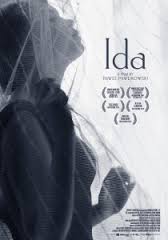
IDA
Poland, 2013, 80 minutes, Black and white.
Agata Kuleszi, Agata Tzrebuchowska.
Directed by Pawel Pawlikowsi.
This is a very striking film, both interesting and challenging.
Director Pawel Pawlikowski went from Poland to the United Kingdom several years ago and made two very well-received films, The Last Resort, about difficulties migrants faced in coming to Britain, and My Summer of Love, a coming of age story of two young women in the English countryside. Now, he has returned to Poland with a story of his country before and during World War II and into the 1960s and the drab era of the communist regime.
The film is of great interest to Polish audiences at home and around the world, a story which takes them back to the relationship between the traditional Polish citizens and the Jews, the anti-Semitic experiences and some help between Catholics and Jews.
A statue of Jesus is the opening image of the film, a group of novice nuns in the 1960s cleaning and repairing this statue which is then put on a pedestal outside the convent. One of the novices is Anna who is preparing for her vows in the coming week. She is called in to see the superior who suggests she go to visit her only surviving relative, an aunt. Because Anna has lived in the orphanage and the convent all her life, she is reluctant to go. The superior orders her to go. She does and does not find an instant warm welcome from her aunt.
We realise that the superior has strong reasons for sending Anna on this visit. Without any preparation, the aunt explains to her that her name is not Anna but Ida and that she is Jewish, something of which the young novice was completely unaware.
Anna immediately calls herself Ida. Her parents were killed during the war and her aunt, who is a local magistrate and respected by the regime, decides that they should go to find out the truth about what had happened. This takes them to the old family home, the farmer and his wife who live there now, his elderly father who is in the hospital, and information about where the family had been buried. For Ida, the explanation of how she came to be in the Catholic orphanage is important and, in the midst of brutal anti-Semitism, there is a moment of grace in the saving of the young child.
The aunt questions Ida about her vocation, her isolation from the world and from any worldly experience and how she can make her vows. There is some complication when aunt and niece give a lift to a musician who plays with his band in the local club.
Of particular interest is the crisis that Ida must face in terms of her commitment, her lack of sexual awareness, of the ordinary trappings of the world, including clothing, smoking, alcohol. The film resolves the crisis with a blend of drama and quiet underplaying.
In fact, the film is reminiscent of classic Polish films of the 1950s and 1960s, filmed in austere black and white, an emphasis on close-ups and body language, classic framing for encounters, a reminder of the qualities of this kind of fine but less complicated film-making.
Ida won an ecumenical award in Warsaw Film Festival, 2013.
1. The impact of the film? For Polish audiences? World audiences? Jewish audiences? Catholic audiences? Winner of awards, including international an ecumenical award?
2. The choice of black and white photography, its effect, the compositions, the framing, light and dark, clear and shadow? Like the Polish and Czech films coming from Eastern Europe in the 1960s?
3. The sensibility of Catholics and Jews and their response to the characters, the situations, the memories of Catholics and persecution of Jews in pre-war Poland?
4. The title, Anna and her discovery that her true name was Ida? The revelation?
5. Poland in the 1960s, post-war, the Communist regime, the drabness of life, the look of the streets, homes, the clubs and the few audiences, and their sitting passively listening to the music? The countryside, the farms, the woods, the dilapidated cemetery? The convent, interiors, the exterior? The aunt’s apartment, the courts? The school, the use of silence, the contemporary songs and their being sung in the club, the band playing? Creating atmosphere?
6. The initial focus on the statue of Jesus, the young nuns and their cleaning and fixing? The habits, devotion? The carrying the statue, putting it on the pedestal? Outside the convent? The symbol – especially in Communist Poland at the time?
7. Convent life, the nuns singing in choir, chanting, meals and silence, old-style habits for the older nuns, glances only in the refectory, a life of contemplation, individual silence? The contrast with the novices, at the meals, their work, sitting together, communicating, the vivid scene of their washing each other and the implications? The background of the girls as orphans, no experience outside the convent? The preparation for vows?
8. Anna, her life, pious, the orphan, going to the superior, not wanting to see her aunt, the superior telling her to go before she made her vows, the irony of the truth that the superior knew? Going, packing with the other novices, travelling on the bus, the arrival, going to her aunt’s house, the aunt’s reaction, bringing her in, immediately telling her the truth, the photos? The effect on Anna? Calling herself Ida, finding that she had a Jewish identity which she did not understand?
9. The character of the aunt, at her home, her relationship with Ida’s mother, her own reputation in the court, Red Wanda, the acclaim after her death for her contribution to Poland after the war? Giving Ida the room? talking with her? The man leaving in the morning, her seeing herself as a slut and using this word to Ida, drinking, at the court, on the panel, listening? The decision to go on the journey? Taking Ida? Going to the farm, meeting the farmer’s wife, the baby, her asking a blessing from Ida because she was a nun? returning and meeting the farmer, the story about Ida’s mother and the family, hidden in the woods? The role of his father? His father in hospital? The search for the father, Wanda going into the cafe, drinking the shots, asking the old man, getting information from the waitress? The contacts, going to the hospital, finding the father, talking with him, his physical condition, almost dying? Ida witnessing everything – and discovering the truth about the boy in the photo, Wanda’s dead son?
10. Giving the lift to the musician, playing the gig? The invitation? Wanda with the dresses, Ida refusing to go? Going to the club, the music, drinking, dancing, Wanda and the man, the night? Ida and her piously kneeling, hands joined, praying?
11. The farmer, telling the truth to Ida, doing the deal that he would show them the place of burial and they would not take his farm? Confessing that he killed the parents and the boy? Ida asking why he had saved her? His explaining that she was so small, would not necessarily be seen as Jewish, taking her to the priest and hoping she would have a life? Going to the woods, the digging, finding the bones, going to the cemetery, the sad burial of the bones?
12. The effect on Ida? About her family, the description of her mother? The references to her mother and her creativity, the stained glass window and Wanda’s comments?
13. The return, Wanda and her looking at the photos, playing the classical music, the drink, going to the window, jumping? Her funeral, Ida, the musician, the tribute to her from the Communist Party?
14. Ida, her return, her decision not to take final vows first vows, the procession, the ceremony, those attending, the profession of vows, dressed in the habit? Ida watching?
15. After the funeral, taking off her habit, putting on her aunt’s dress, going down to the bar, knowing that she liked the music, the musician, the band playing? Her drinking? Smoking? Going with the musician, the sexual encounter, being sluttish like her aunt? Her aunt and her psychological abuse of Ida by showing her this kind of example and the innocent Ida following it?
16. After the sexual encounter, leaving the men in the bed, knowing the questions that her aunt had asked about taking vows without experience? Her decision, returning to the convent, outside the convent, the statue of the Sacred Heart? Her future?
17. This glimpse of Poland, Catholics and pre—war Poland? The aftermath, the Communist occupation? The place of the church? The convent? Jews in pre-war Poland, treatment, persecution, sheltering, death?
18. Ida and her identity, Jewish, Catholic? And the responses of Jewish audiences? Catholic audiences?
Published in Movie Reviews
Published in
Movie Reviews
Tagged under
Saturday, 18 September 2021 19:50
LIttle Devil, The
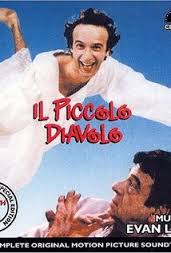
IL DIAVOLO PICCOLO /LITTLE DEVIL
Italy, 1989, 101 minutes, Colour.
Roberto Benigni, Walter Matthau, Nicoletta Braschi,, Stephania Sandrelli, John Lurie.
Directed by Roberto Benigni.
This is a film strictly for Italian tastes. It is a film strictly for those who like the comedy and claiming of Roberto Benigni, who stars, and won an award for his direction. Fans of Walter Matthau will want to see the film but will be puzzled as to why he is starring in it, in Italy, as a Catholic priest, using his usual deadpan delivery as well as his shambling gait in his character.
The film opens with Matthau as an American Catholic priest, Fr Maurice, at the American College in Rome for seminarians. He goes to confession, an anguished experience, his feeling lost, wondering how long he can last. He confesses to a sympathetic priest.
He is called to a noisy situation where it emerges that a middle-aged, large lady, is behaving very strangely, talking with a male voice. It emerges that she is possessed by a devil who wants to come out of her. Fr Maurice is sceptical but does a blessing and suddenly the woman is well again, puzzled by what happened, and there is the devil in the form of Roberto Benigni.
While Matthau has an opportunity for comic situations, especially in his dealings with the devil, his exasperation with him, trying to explain the, finding him in the seminary, finding him clothes instead of the woman’s fur coat that he is wearing, finding him gatecrashing a clerical dinner which makes Fr Maurice drink all the more. He goes outside with him, walks in the street, sees him levitate, and finally goes home to sleep things off. In the morning, Fr Maurice cannot face celebrating Mass and the Devil goes into the sacristy, puts on vestments, does not know exactly know what to do, and decides to turn the celebration into a fashion show, similar to that that he has seen the day before, with the ladies all parading up and down the aisle as models. This is the final straw for Fr Maurice.
Then the Devil goes off on his own, meeting a professor and discussing religious matters, going to hotel, meeting an attractive woman on a train who has a letter of admiration – whether to him or to Fr Maurice is not always clear. This is a guest role for Stephania Sandrelli. Fr Maurice meets a friendly advisor, played by John Lurie, actor in some of Jim Jarmusch’s films (as was Benigni himself).
He meets the model, an attractive young woman, Nina, played by Benigni’s wife and co-star in practically all his films, Nicoletta Brascchi. She seems to be woman of loose morals than might be expected and tries to tempt the devil, who though he knows a lot of practical things and vocabulary, seems to be singularly ignorant about sexual matters which have to be explained to him. And that raises his enthusiasm.
Once again, he encounters Fr Maurice who, in lay clothes, seems to be on a date. Why so is not always clear, audience suspicious of what is happening it may be connected with Fr Maurice’s anguish at the beginning of the film and his confession.
It turns out that Nina is another devil with the commission to bring Benigni back home, to hell, and, when he is possessed by her, he vanishes.
Published in Movie Reviews
Published in
Movie Reviews
Tagged under
Saturday, 18 September 2021 19:50
French Kiss
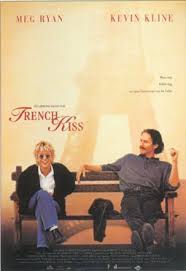
FRENCH KISS
US, 1995, 108 minutes, Colour.
Meg Ryan, Kevin Kline, Timothy Hutton, Jean Reno.
Directed by Lawrence Kasdan.
In French Kiss Paris and France have never looked better and provide an attractive setting for this entertaining piece of fluff - a dithery woman going to Paris to confront her fiance who is now infatuated with a Frenchwoman encounters a gauche Frenchman who happens to be a thief...
However, the performances and the dialogue are more sparkling than might be expected. If you enjoy Meg Ryan, this is very much her show. If you enjoy Kevin Kline, he combiness raffishness with charm and a persuasive broken French accent. And, in fact, he brings some depth to what is a very light romantic comedy.
Entertaining souffle.
1. A romantic comedy, French and American style? Meg Ryan and Kevin Kline? The title?
2. The American sequences, the comparisons and contrasts with the French? Each countries’ comments on the other?
3. The Paris locations, ordinary, the landmarks? Hotels, the embassy? The train ride, the vengeance? Cannes? The musical score and the range of French songs and songs about France?
4. Kate, frightened of air travel, in the simulator? Her hysterical behaviour? The introduction to Kate, the Meg Ryan, type, look, manner? In love with Charlie? Happy future?
5. Charlie, ordinary, his love for Kate, devotion? The pledges before he went to France? Phone call, finding a new love? The upset for Kate?
6. The effect on Kate, sad, the decision to her to friends? Meeting Luc on the plane, the initial clash, his questioning her, his summing up? Her reaction, the drink, sleeping? Getting off the plane, taking her bag to get through customs with the necklace? Looking for the taxi?
7. Luc, French style, his look, stealing the bottles, trying to smoke? Talking to Kate, the attraction, his criticism of her, as American, issues of sex? Necklace and the vine, in her bag? The policeman meeting him at the airport? His wariness?
8. Kate at the hotel, the concierge being rude, the barriers between them – and her later oneupmanship on him?
9. Luc, going to the hotel, searching for her, and his taking her bags, Bob and his style, conman, chatting up Kate, the advances, stealing? Luc tracking him down, taking Kate, the bag, no jewels, Bob giving away her clothes? The police officer and his taking in Bob, the interrogation?
10. Luc, stealing the car to go to Bob’s, his deal, in the street, giving her money, the explanation of the vine and his ambitions?
11. Kate going to the embassy, not having any money, the Americans unsympathetic to her? Going to the Canadian Embassy, wanting to be a Canadian, the information about the felony? Going back to the concierge and her tantrum?
12. Taking the train, Luc’s offering to help, riding the bike to the station, the policeman looking for him, the bonds between them, saving his life? Luc and his escape, to the beautiful countryside, Kate eating cheese, being sick, having to get off the train?
13. The irony of the station being at Luc’s town, walking through the town, Luc’s brother and his instigating the fight? Luc’s story, yet his father calling him, joining the family, taking Kate around the land, explaining the soil, the vines, his special box and the various flavours? Her appreciation?
14. Going to Cannes, Kate and her spying on Charlie, the fuss and her falling in the cakes?
15. Charlie, a changed man, his clothes, with Juliet? Going to the beach, Kate talking with them? the meal, the being seductive to Charlie? His response? Kate and her changing? Luc, the dinner with Juliet, seduction?
16. The police officer, telling the truth to Kate, her persuading Luc that she would take back the necklace, getting the money, not as much as hoped for?
17. Kate on the plane, Luc coming to get her, taking her to his property, a new beginning for them both?
Published in Movie Reviews
Published in
Movie Reviews
Tagged under
Saturday, 18 September 2021 19:50
Willard/ 2003
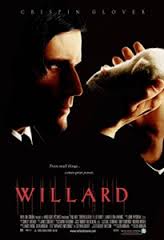
WILLARD
US, 2003, 98 minutes, Colour.
Crispin Glover, Laura Elena Harring, R.Lee Ermey, Jackie Burroughs.
Directed by Glenn Morgan.
Willard is not exactly a remake of the 1970s film with Bruce Davison and his friendship with a rat called Ben. This film had a sequel, Ben, made famous by the theme song sung by the Jackson five, and especially the solo by Michael Jackson. This film is something of a sequel, the Willard of the title is the son of Bruce Davison, whose pictures are seeking throughout this film.
Crispin Glover gives a tortured performance as Willard, tried to work in an office under their boss who was his father’s friend and bought him out, R.Lee Ermey, at at home with his semi-demented mother, Jackie Burroughs.And there are a lot of rats in the house.
Willard befriends a white rat called Socrates and forms a strong friendship with him. In the meantime, it is still there as a malevolent presence.
When the sympathetic office worker brings him a cat, there is mayhem in the house as the rat skates chase the cats – to the singing of Michael Jackson and Ben!
Needless to say, the boss is destroyed by the rats, the rats overwhelmed Willard and is taken off to a mental institution.
Director and writers, Glenn Morgan and James Hong, were responsible for some of the Final Destination movies.
1. The original Willard, and Ben? Films of the 1970s? Animal terror? Rats?
2. This film not as a remake but as a sequel? The continuity with Willard and his father, with Ben?
3. The locations, the interiors of the house, dark, older, the basement, with large room, the rats? The contrast with the modern office, desks, Mr Martin’s office? The rooms in the building, the lifts, the barriers?
4. The musical score, the song, Ben, and Michael Jackson singing it? From the original film, Ben? Sung during the sequence with the cat and the rats? The final credits? This focus on Ben?
5. Willard as a character, Crispin Glover and his screen presence, eerie, crazy, the memories of his father, the photos of Bruce Davison? Talking about him and the company? His mother, her presence in the house, treatment of Willard, the clash, care for her, her complaints, her death? The issue of debts, the ownership of the house? Willard with his job, but ineffectual?
6. At home, the rats, the white rat, Socrates and his presence, Willard treating him as a friend, his attachment? Ben, his presence, always watching, looking down on Willard? The jealousies?
7. At the office, Cathryn, nice? Mr Martin and his shouting, his having bought the company, wanting the house, the arguments with Willard, firing him? Willard, the advice of the lawyer, his situation? His returning to Martin, Martin watching the pornography, Willard setting the rats on him, Martin bashing Socrates? Martin being trapped, his death?
8. Cathryn, her friendship, at the office, his desk? The gift of the cat? The rats and the cat and the destruction? Her return, wanting to help, looking in the window, discovering the truth?
9. Ben, a malicious rat, Willard shutting the entrance, his breaking through it? The rat traps? Socrates and Martin bashing him? The motives?
10. Willard in the house, the growing number of rats, Ben watching?
11. The officials outside, looking in the window, their shock?
12. Willard, in the asylum, alone, his meal, the comments of the guard?
13. An interesting interpretation of a 70s story in the 21st century?
Published in Movie Reviews
Published in
Movie Reviews
Tagged under
Saturday, 18 September 2021 19:50
Wolvercote Tongue, The

MORSE: THE WOLVERCOTE TONGUE
UK, 1987, 100 minutes, Colour.
John Thaw, Kevin Whately, Simon Callow, Kenneth Cranham, Roberta Taylor.
Directed by Alastair Reid.
This is a very early entry in the Inspector Morse films, thirty-three in all. It was part of the establishing of the character of Morse, played by John thaw, a loner, crusty, fond of his music, fond of his ale, establishing a relationship with Lewis, Kevin Whately, as his assistant, impatient with him, amazed at his ignorance of literature and music.
This is a double mystery, associated with American tourists, a famous jewel which goes missing, and the death of the owner. In fact, this something of a red herring, because the main mystery belongs to guide at Oxford and his jealousy of his wife and an affair she was conducting.
One advantage of the film is the performance by Simon Callow as a pompous husband and Kenneth Cranham as the obsessed guide.
1. The popularity of the long-running series? Television movies? With style? The popularity of Morse and his personality, enigmatic and mannered style? The personality of Lewis? Their relationship? The solving of the crimes? Intricacy of the plot? The psychological dimensions, the mystery and clues? Police work and solving the mysteries with their own abilities? The work of Colin Dexter?
2. The Oxford settings, the city and landscapes, the cityscapes, the buildings? Comments about Oxford and Oxford society? The ironies about Oxford and the dons? The university city? Ordinary people? Their interconnections? So much beauty – and so much crime?
3. The quality of the mysteries, character-driven? Sufficient information, sufficient clues? The exploration of character and clues?
4. John Thaw as Morse, his personality, the changes over the years, yet remaining the same? The mystery of his name? His crusty manner, the bachelor (but romantic at times)? His own authority – exercised over Lewis – and his reaction to authorities? Promotion or not? The changing of his attitudes towards Lewis, bossing him, patronising him about education and culture? The issue of music? Drinking ale? His car? Quietly at home, at work? With Lewis, understanding the situations and characters, the deductions? His being a good listener – but critical?
5. The contrast with Lewis, the family man, the ordinary policeman, education and lack of education, his being put down by Morse – but enjoying his comeuppance now and again? Music and his ignorance? The first reactions, Lewis being patient? His admiration for Morse, having to do so much leg work, to formulate hypotheses? Working under pressure? Collaborator and partner of Morse?
6. The police authorities in Oxford? The medical examiners – and Morse and his attitude towards the female authorities? Sexist and patronising? Changing?
7. The quality of the film as a crime thriller, a thriller with intelligence and demands on the audience?
8. The introduction to the crime, the credits, the background in Oxford, beyond?
9. The range of personalities, motives? Truth and concealment? Jealousies? Deceits and angers? The academic and religious backgrounds?
10. The double mystery? The death of the American tourist? The death of the academic?
11. The American tourists, Miss Williams as guide, her exasperation with the group, with Mrs Roscoe? Mrs Roscoe and her complaints, and answering the tourist questions for Mr Downes, planning a letter of complaint, the others not signing, her husband leaving her? Settling in at the hotel? The walks of the afternoon? The discovery of Mrs Poindexter and her death? Her husband and concern? His disappearance? The dinner, the lecture, the walking tour, the information about the Reformation and Oxford?
12. Mrs Poindexter, wanting to donate the Wolvercote Tongue? Her financial arrangements? Her husband? His failed business? Touring with his wife? Her heart attack? Considered murder? Mr Poindexter, meeting with the woman, seen in the train, return to Oxford, the reconciliation with his daughter? Throwing the Tongue in the river? His telling the story? The solution to the mystery?
13. Professor Croft, dapper, the relationship with Miss Williams, calling it off? His injured wife? Tending her? His relationship with Mrs Downes? The discovery of his body? Naked? The speculation?
14. Mr Downes, his work in Oxford, the relationship with Prof Croft, his giving the lectures, getting his notes, the tour of the town, his not being himself? Miss Williams telling him about the murder? His being on the station at 5 o’clock? The encounter with Morse and Lewis? Their visit to Mrs Downes, her talk about the curtains, the suitcase?
15. Mrs Downes, in London, the Lost and Found centre, putting in the case, the tag? Phoning her husband? His killing her? Returning on the train? Being questioned by Morse, the tag, the times, his confession? His hatred of Croft? Not being able to love his wife, killing her?
16. Morse and Lewis, the hard work, Lewis continually tired? The interviews? Going to Miss Williams, comforting her, her story? Her relationship with Croft? Going to see Mrs Downes, her cheery story? Lewis and the talk about the curtains?
17. The doctor with Mrs Poindexter, going to the dinner, his abrupt treatment from Morse?
18. The coroner, the examinations, his not giving an opinion, his taunts at Morse knowing everything, giving information?
19. The case over 24 hours or more, the investigation, the solution? The Tongue found?
20. One of the earliest of the Inspector Morse series?
Published in Movie Reviews
Published in
Movie Reviews
Tagged under
Saturday, 18 September 2021 19:50
My Neigbour, Totoro
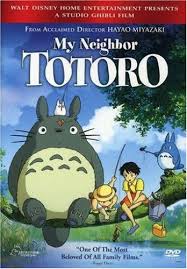
MY NEIGHBOUR TOTORO
Japan, 1988, 86 minutes, Colour.
Directed by Hayao Miyazaki.
My Neighbour Totoro is a delightful entertainment from Ghibli Studios. It is a product of the early years of director Hayao Myazaki. And it is interesting to look at in view of his later, very successful career, with Princess Mononpoke, his Oscar-winning Spirited Away, Ponyo by the Sea, Aritty, and his final film, The Wind rising.
The main elements are present, the distinctive drawing of the characters, Japanese but easily accessible to international audiences, the bright colours, the enjoyment of nature, the music and songs.
Miyazaki has always included touches of fantasies with his realism and this is the case here with the character of Totoro and his interventions for the children.
A light classic from Ghibli Studios.
1. The popularity of this animated film? In its time? As part of the work from the director and Studio Ghibli?
2. The audiences the 80s? Children? Adults? The style of animation, the drawing, the backgrounds, the characters, their facial expressions, actions? The songs? the musical score? Light and delightful?
3. The blend of realism and fantasy?
4. The basic situation, the family moving to the country, the father driving, the two daughters, into the countryside, discovering the house, all the details of the house and the buildings, the children playing, exploring, cleaning, refashioning the house?
5. The mother sick, in hospital, the going to the countryside to be near her? The grandmother and her looking after the house, her friendliness, care for the girls? The awkward boy, his deliveries?
6. The father, going to town, the girls, enjoying the trip, the town itself, people, shops? The visit to the hospital? Seeing their mother, wanting her to come home? Her illness and its seriousness?
7. The children, playing, going into town, the little girl following, taking the wrong turn, lost? The details search her, everyone involved?
8. The fantasy, Totoro, his size, playfulness, the baby? His appearing to the girls? Holding them, comforting them, helping them? Friend and neighbour?
9. The resolution, the father with the children, hopes for the mother’s return?
Published in Movie Reviews
Published in
Movie Reviews
Tagged under
Saturday, 18 September 2021 19:50
Sacrifice/ China
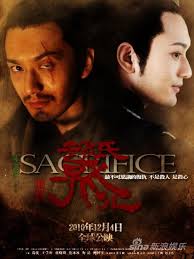
SACRIFICE
China, 2010, 122 minutes, Colour.
Directed by Chen Kaige.
Sacrifice is a pageant of Chinese history, warfare and betrayals. It has been directed by Chen Kaige, noted for his operatic and theatrical style in such films as Farewell, my Concubine, The Emperor and the Assassin, and the film including the siege of Nanking, Forever Enthralled.
The sacrifice of the title belongs to a doctor, insignificant in the ordinary run of things, but becoming involved with the wife of a general who has been assassinated, delivering her child, keeping it from the dictator who wants to eliminate all his rivals. After the battles and the death of the child’s father, the doctor brings up the baby as his own. But the dictator also takes an interest in the child, becoming a godfather and helping him train.
Ultimately, the truth comes out, the boy divided in his loyalties between the doctor and his godfather, and the doctor fulfilling the sacrifice he had made of his own child and his wife.
1. Chinese history, audience interest, Chinese audiences, worldwide? The world popularity of this genre?
2. Period, costumes, decor, musical score?
3. Chen Kaige and his career, his moving into the martial arts, Chinese history genre? Success?
4. The settings, the sets, vast, the Royal Palace, the soldiers? The contrast with the ordinary sequences, the doctor and his friend, his wife giving birth? The action sequences? The musical score?
5. Action, stunts, editing and fast pace?
6. The history, the Emperor, his sister’s marriage, the general, young, ambitious? The contrast with general children General Zhao? The rivalry, the command? The taunts to General Tuan, the Emperor commenting if he had married the sister? The war, General Zhao and his victory? The accidents, the attempt on his life, tripping the horse, the arrow?
7. Zhao, his wife, her pregnancy, his being killed, his wife putting the pillow as if she were pregnant, giving birth? The hostile soldier, the messenger of Tuan, his allowing her to live? Her killing herself? the doctor and the taking of the baby?
8. Tuan, rounding up all the children, to kill the baby? The doctor, his age, talking with his friend, the birth of his child, love his wife? Tuan and his decree? The issue of saving the heir and sacrificing his son? Tuan and his menace?
9. The theme of sacrifice, his wife dying, saving the child and going to Tuan to serve him?
10. Tuan, his manipulating the deaths, the scientist and the insects and the cinnamon and the bites, more deaths? The death of the general who would have looked after the heir?
11. Tuan and becoming the godfather, the years passing, his treatment of the boy?
12. Ching, the former soldier, their plotting, the son reaching the age of 15, to tell him or not, the result, his not believing?
13. The boy, calling both men father, his dependence on Tuan, the gift of armour, the training?
14. His eagerness to get a battle, enjoying it, his being pursued, Tuan rescuing him?
15. The confrontation, the truth, the boy getting the pill to heal Tuan? Their talk, the swords? The fight?
16. The boy, the killing of children, Ching being stabbed?
17. Ching, dead, walking into the city, the vision of his wife?
18. How typical of this kind of martial arts and historical Chinese film?
Published in Movie Reviews
Published in
Movie Reviews
Tagged under